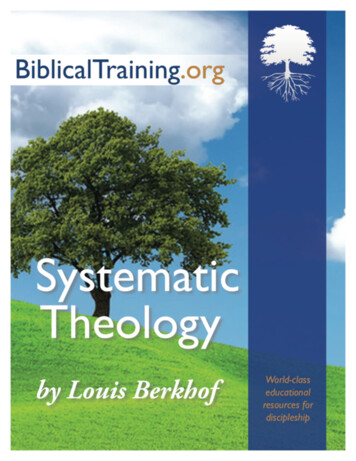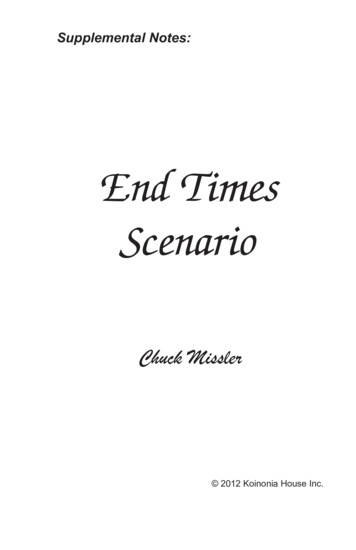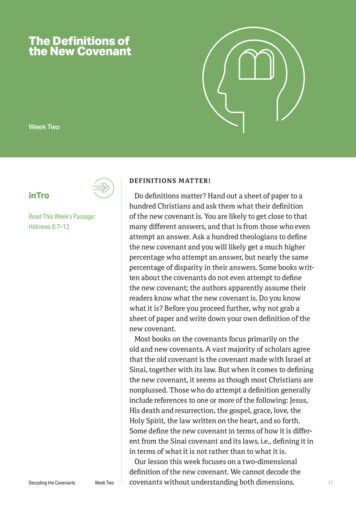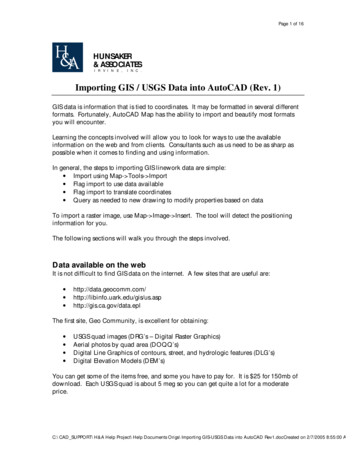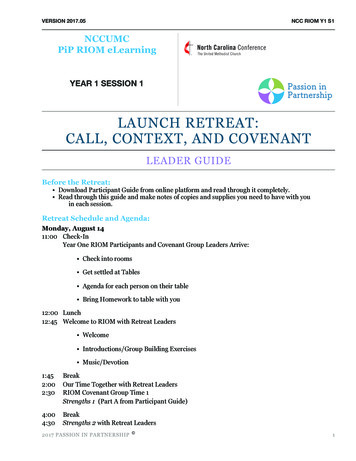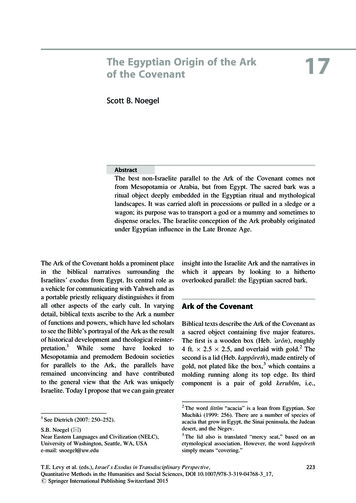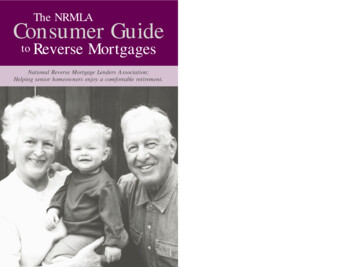
Transcription
The NRMLAConsumer Guideto ReverseMortgagesNational Reverse Mortgage Lenders Association:Helping senior homeowners enjoy a comfortable retirement.
Reverse mortgages are emerging as a significant financial securitytool for senior homeowners because of the broad range of needs theseunique loans can satisfy. Senior homeowners of all income levels havetaken out reverse mortgages for many different reasons. For some,reverse mortgages provide the extra dollars that let them stay securelyin their homes throughout retirement. For others, reverse mortgagesprovide a means to live more comfortably and pursue their dreams.This guide developed by our organization should answer many of yourquestions about reverse mortgages and help determine if a reversemortgage is the right option for you.The NRMLAConsumer Guideto ReverseMortgagesThe National Reverse Mortgage Lenders Association (NRMLA) is anational nonprofit trade association whose member firms originateand service reverse mortgages in the U.S. and Canada. Working withits members, NRMLA strives to promote greater public awareness ofreverse mortgages. Lenders that belong to NRMLA agree to abide byour Code of Conduct (see p. 11) and reflect our set of Best Practices intheir business operations.Published byNATIONAL REVERSE MORTGAGE LENDERS ASSOCIATIONPeter BellPRESIDENTNATIONAL REVERSE MORTGAGE LENDERS ASSOCIATIONModels featured in this booklet are used for illustrative purposes only.Copyright 2000 National Reverse Mortagge Lenders Association
Diverse Needs, One Solution:Seniors Live Better Because ofReverse MortgagesNORMAN AND MARGARET VAN DINE’S NEED:Home ImprovementNoblesboro, MaineNorman and Margaret Van Dine of Nobleboro, Maineneeded a downstairs bedroom. Besides preferring to avoidthe trek upstairs to the second floor, the Van Dine’s, both76, wanted the extra room to more comfortably accommodate the frequent visits from their two daughters andfour grandchildren — that is when the Van Dine’s aren’ttraveling to California and New Hampshire to visit them.Although Mr. Van Dine, a former Navy pilot and flightinstructor during WWII, still works three days a week, theVan Dine’s were seeking a financial option that wouldallow them to pay for the new the bedroom without addingto their list of monthly expenses.The Van Dine’s obtained a reverse mortgage, whichpaid off their first and second mortgages and allowed themto move forward with their building plan.“It’s done. We’re sleeping down here and we’re verypleased with it,” says Mrs. Van Dine. “And when we getolder, we won’t have to go up and down the stairs.”Like a growing number of seniors, the Van Dine’s areliving more comfortably thanks to their reverse mortgage.UnderstandingA Reverse MortgageReverse mortgages can provide seniors a means toaccess the built-up wealthin their homes and use it for justabout anything. And since 1989,these unique loans have beenhelping seniors.Although reverse mortgages havebeen around for several decades inone form or another, it wasn’t until1989 that a truly nationwide productbecame available — the Home3
Equity Conversion Mortgage (HECM). The HECM, insured by theFederal Housing Administration, a branch of the U.S. Department ofHousing and Urban Development, is the most popular reverse mortgage product currently available. While 50,000 reverse mortgages ofall types have been made, nearly 7,000 HECM loans were made in1999 alone.HELEN ROUSE’S NEED:Remain in Her Home, Pay off Medical Bills.Atlanta, GeorgiaAfter undergoing back and lung surgery, Helen Rousehad medical bills to pay. Divorced since 1974, Ms. Rouselives alone and has two sons and a daughter in nearbyAtlanta and another daughter in Maryland. With a firstand second mortgage on her house, she knew she neededhelp with her finances.Then one of her daughters told her about reverse mortgages and soon Ms. Rouse obtained an FHA Home EquityConversion Mortgage.The loan proceeds paid off her outstanding mortgagesand helped with her medical bills. “There’s still a mortgagethere, but now I don’t have to pay it,” says the 70 year-oldMs. Rouse.Since her surgery, Ms. Rouse says she’s, “doing fine,”thanks to the financial security provided by her reverse mortgage. Although she cannot get out to church or the movies,Ms. Rouse enjoys reading mystery novels and the Bible in thecomfort of her own home.What Is a Reverse Mortgage?This special type of mortgage allowsyou — the senior homeowner — toaccess the equity you’ve built up in yourhome and use the money however youwish — all while letting you stay in yourhome. It’s called a reverse mortgage,because the flow of payments isreversed from a traditional mortgage.The lender makes payments to you, or arranges a line of credit thatis available for your use. This differs from a traditional mortgageused to purchase or refinance a home in which you must makemonthly mortgage payments to the bank.Who Can Get a Reverse Mortgage?To qualify, you must: Be 62 years old or older (at least one of thehomeowners in the case of a couple); and, Be a homeowner (and have equity in yourhome). In fact, you may qualify for a reversemortgage even if you’re still paying down afirst mortgage. Single-family homes, townhouses, and condominiums are eligible.5
In addition, you should expect to be staying in your currenthome for several more years, and not be concerned with givingyour home debt-free to your children or heirs after you are gone.Are There Any Restrictions onWhat I Can Do With the Money?No. The only limitation is your imagination.You can use the money available from areverse mortgage however you wish: for extraspending money, travel, prescription drugs orin-home health care, home repairs andimprovements, long-term care or homehealth-care insurance, gifts to yourchildren and grandchildren, orsimply to pay bills. Some seniorshave even used reverse mortgagesto continue their education.JOHN AND HELEN FOY’S NEED:Lifestyle EnhancementRedlands, CaliforniaIn their 70s, John and Helen Foy are premier examplesof today’s empowered seniors — they are full of vigor andtravel continuously, enjoying their retirement.Life-long motorcycling enthusiasts, John and Helenobtained an FHA reverse mortgage to supplement theirincome so they could continue to enjoy their lifestyle —riding throughout the country on their Harley-Davidson.If you’re looking for “Papa” John and “Mama” Helen,you’ll probably find them cruising the Pacific CoastHighway on their Harley — thanks to a reverse mortgage.7
How Much Money Can I Get?How Much Does a Reverse Mortgage Cost?This depends on a few factors, including your age, the value ofyour home, and your built-up home equity. Other factors are thetype of reverse mortgage product and the payment option that youselect. Calculators that can help determine how much moneywould be available to you from different reverse mortgage products and payment options, given your specific circumstances, areavailable at a few Internet Web sites and through most reversemortgage lenders or reverse mortgage counselors.Many of the same costs that apply to home purchase mortgagesalso apply to reverse mortgages. You can expect to be charged anorigination fee, a mortgage insurance fee, an appraisal fee, andcertain other standard closing costs. In most cases, these fees andcosts are capped and may be financed as part of the reverse mortgage.What Kinds of Reverse Mortgage ProductsAre Available?The most popular type in the U.S. today is the Home EquityConversion Mortgage (HECM). This reverse mortgage product isinsured by the federal government, specifically by the Federal HousingAdministration (FHA), the same federal agency that insures thewell-known FHA loans that many younger households use topurchase their first home.Other widely available reverse mortgage products include the(1) Fannie Mae Home Keeper loan; (2) the Financial Freedom EquityGuard loan; and (3) the Financial Freedom Cash Account plan. Thelatter two are “jumbo” reverse mortgage products offered by FinancialFreedom Senior Funding Corporation in many, but not all, states. TheHECM and Home Keeper reverse mortgages are available in every state.How Can I Receive My Money?You, the consumer, decide how you want to receive yourmoney from a reverse mortgage. In general, your payment methodoptions are: (1) a lump-sum upfront payment; (2) a line of credit(the most popular); (3) monthly payments for as long as you live inyour home (or for a pre-determined, shorter period); or (4) a combination of monthly income and a line of credit.8When Does the Loan Have to Be Repaid?For as long as you remain in your home, the reverse mortgagestays outstanding and you don’t make any monthly payments tothe bank. The loan becomes due when you no longer occupy yourhome as a principal residence. That is, if you (1) sell the house;(2) move out of the house for more than 12 months; or (3) passaway (the last surviving borrower).At this point, the loan amount due isequal to the sum of the total funds youreceived from the mortgage, includingthe initial fees and closing costs chargedon the loan, plus all accrued interest. Toprotect you, the repayment amount cannot exceed the value of your home at thetime the loan is repaid. And the house doesn’t have to be sold topay off the loan. You, your children, or heirs always have the optionof paying off the loan and keeping the house.Where Can I Find aReverse Mortgage Lender?It is mostly specialized lenders thatoffer reverse mortgages today. To locate onein your state, call NRMLA (1-866-264-4466,toll-free) or visit our Web site(www.reversemortgage.org).9
What Else Should I Know? Before you can be obligated to pay any fees, you mustcomplete an educational session with an approved reversemortgage counselor. A reverse mortgage lender can refer you toan agency in your area. Or you can contact HUD’s HousingCounseling Clearinghouse (1-800-217-6970 orwww.hudhcc.org.) You hold title to your house during the term of the reversemortgage, not the lender, just like with a conventionalhome mortgage. You will never, under any circumstances resulting from thereverse mortgage, be forced to leave your home. You canremain in it for as long as you like, provided you make yourreal estate property tax and insurance payments. Your credit history is not a factor in determining eligibilityfor a reverse mortgage. There are no minimum or maximum income requirements toNational Reverse Mortgage Lenders AssociationCode of ConductMembers of the National Reverse Mortgage Lenders Associationare mindful that the soundness, usefulness, prosperity, and futureof the Reverse Mortgage industry depends upon the honor andintegrity of all persons engaged in the business.Each member of this association agrees to observe and maintainthe following standards of conduct in dealing with the seniorcommunity and their families:(1) Treat all clients with respect and dignity.(2) Protect the client’s privacy and confidentiality and notdistribute personal financial information to any third partywithout permission from the client.qualify for a reverse mortgage. Monthly funds received from a reverse mortgage is tax free.(3) Encourage clients to discuss the loan transaction with familymembers and/or other trusted advisors. Your line of credit can grow. If you choose a HECM reversemortgage with a line of credit payment option, the size of theline of credit will increase annually for inflation. A reverse mortgage will not affect regular Social Securitypayments. Depending on your situation, a reverse mortgagemay affect the benefits you receive, if any, from the federalSupplemental Security Income (SSI) program, or state-administered programs like Medicaid. If this is the case, we suggestyou consult with your local Area Agency on Aging, a reversemortgage lender, or other benefits expert.10(4) Inform clients at no charge about all of the member’s reversemortgage programs and assist each client to determine theprogram most suitable for his or her needs.(5) When estimating potential reverse mortgage benefits, clearlyand accurately identify all costs.continued11
(6) Take reasonable steps to check out the background andprocedures of third parties before accepting referrals ofbusiness from them, and refuse to accept referrals from thosethat are found unacceptable. Members shall disclose toclients any third party with a financial interest in the reversemortgage transaction.(7) Not imply to a borrower that he or she is obligated topurchase any other product or service offered by the memberor any other company in order to obtain a reverse mortgage.(8) Pay all loan proceeds directly to the borrower, except to retireexisting debt, pay a contractor from the borrower’s repairset-aside account, or pay property taxes or hazard insurancepremiums from the borrower’s set-aside account for taxesand insurance.(9) Employ individuals who have passed a background check andare found to be of good moral character.(10) Report any suspected violations of the Code of Conduct tothe National Reverse Mortgage Lenders Association, andcooperate with all their investigations.(11) Make a good-faith effort to resolve concerns received fromclients about a reverse mortgage transaction.12
National Reverse Mortgage Lenders Association1625 Massachusetts Ave., NW, Suite 601Washington, DC 20036-2244Tel. 202.939.1760Toll-Free Tel. 866.264.4466Fax. 202.265.4435e-mail: reversemortgage@dworbell.comWeb: www.reversemortgage.org
Consumer GuideThe NRMLA to Reverse Mortgages National Reverse Mortgage Lenders Association: Helping senior homeowners enjoy a comfortable retirement. . offer reverse mortgages today. To locate one in your state, call NRMLA (1-866-264-4466, toll-free) orvisit our Web site (www.reversemortgage.org). 8 9.


